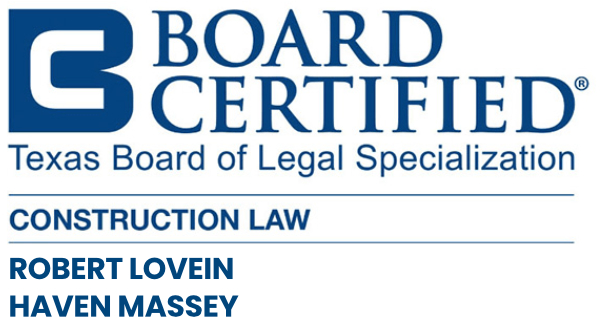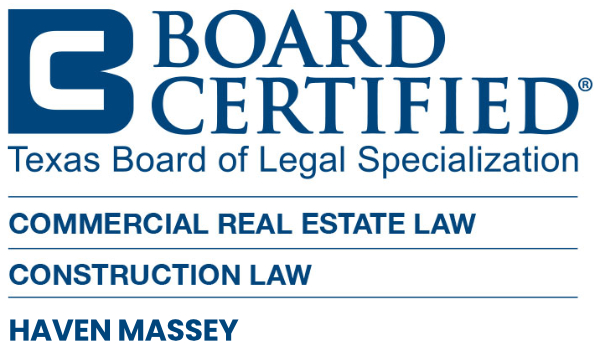Lovein Ribman’s employment attorneys act as outside general counsel to businesses of all sizes across the state of Texas by helping them understand and respond to the day-to-day employment related issues that arise in running a business. Our employment attorneys are well versed in all aspects of Texas and Federal employment laws and are available to assist you with resolving the most complex employment issues. If you are facing an employment issue and need the assistance of an experienced employment attorney, please submit the contact form or call us at (888) 368-2483 for a free no-obligation consultation. Below is a brief discussion of some common employment-related questions and issues.
At-Will Employment
Texas has long held to the employment “at-will” doctrine, which provides that absent a specific agreement to the contrary, the employment relationship may be terminated by either the employer or employee at-will, with or without cause, before or after the employee commences employment for the employer. To defeat the strong presumption of an at-will relationship, the employee has the burden of showing that the employer unequivocally indicated a definite intent not to terminate the employee except under clearly specified circumstances or conditions. Generally, representations contained in an employee handbook will not defeat the at-will relationship, especially if the handbook contains an express disclaimer. Further, an oral agreement of employment will not defeat the at-will status, absent a definite stated intention to the contrary.
For Term Employment and Term Employment Agreements
The employer can modify the presumptive at-will employment relationship by agreeing in writing to employ an individual for a specific period of time or by agreeing not to terminate the employment relationship except under clearly specified circumstances or conditions. Typically, this type of relationship is limited to upper management and/or executives, and should be reduced to a written Employment Agreement which often contain provisions addressing the term of employment, duties/responsibilities, compensation and benefits, earned ownership in the company, conditions for termination, non-solicitation, non-competition, and non-disparagement provisions. Our Employment Attorneys routinely draft Term and/or Executive Employment Agreements and can specifically tailor an agreement to fit your needs.
Employee’s Duties to Employer
An employee owes fiduciary duties to the employer in connection with the employment relationship, with or without a written employment agreement. An employee’s violation of his/her fiduciary duties to the employer, creates a cause of action for breach of fiduciary duties and may entitle the employer to monetary damages. The typical employee fiduciary duties include:
Duty to Exercise Reasonable Care: An employee has a duty to exercise reasonable care, competence, and diligence in the performance of his/her duties. This includes a duty to exercise reasonable skill in the performance of his/her employment duties.
Duty of good conduct: An employee has a duty to conduct himself/herself properly in the performance of his/her duties and to engage in no act which would damage the employer’s business.
Duty to Provide Information: An employee has a duty to use reasonable care to disclose to the employer all information relevant to the employment duties entrusted to him/her.
Duty Regarding Employer’s Property: An employee has a duty to not create the appearance to third parties that the employer’s property is his/her property, not to commingle the employer’s property with his/her property, to keep safe and turn over to the employer any money or other tangible things received in the performance of his/her employment duties and to account for any monies paid out on behalf of the employer.
Duty to Act Only as Authorized: An employee has a duty to act in accordance with the employer’s instructions in the performance of his/her employment duties.
Duty to Obey Employer’s Instructions: An employee has a duty to follow the employer’s instructions in connection with the performance of his/her duties.
Duty of Loyalty: An employee has a duty to act only for the benefit of the employer in all matters in connection with the employment relationship. This general duty includes: (1) not to acquire a material benefit from a third party in connection with transactions conducted on behalf of the employer; (2) not to take any action that may have adverse consequences for the employer; (3) not to engage in competition with the employer during the existence of the employment relationship; and (4) not to utilize or disclose confidential or propriety information belonging to the employer.
A good practice is to include a list of these duties in the company’s Employee Handbook so as to make the employee aware of these duties and that the employer expects the duties to be followed. Lovein Ribman’s employment attorneys can modify and/or draft an Employee Handbook to include these fiduciary duties and specifically meet your company’s other needs.
Applications and Interview Pitfalls
An employer should ask only job-related questions on employment applications and job interviews. Non job-related questions could be used in litigation or as evidence of discrimination. The following is a list of topics that an employer should not inquire into during the hiring process:
Disability Related Questions: An employer may not ask if an applicant has a disability that would interfere with his/her job performance. The EEOC provides the following examples of impermissible disability-related inquiries:
- Do you have a disability that would interfere with your ability to perform the job? However, an employer can rightfully ask, “Can you perform this job with or without reasonable accommodations?”
- How many days were you sick last year?
- Have you ever filed for workers’ compensation benefits?
- Have you ever been injured on the job?
- How much alcohol do you drink each week?
- Have you ever been treated for alcohol problems?
- What prescription drugs are you currently taking?
- Do you have asthma?
The one exception to the rule, is that the employer can ask “limited questions” concerning the need for reasonable accommodations, but only if the employer reasonably believes the applicant will need a reasonable accommodation to perform a job function because: (1) the applicant has an obvious disability; (2) the applicant voluntarily disclosed a hidden disability; (3) the applicant voluntarily disclosed to the employer that he/she will need a reasonable accommodation.
Prior Workers’ Compensation Claims: An employer cannot ask an applicant or a third-party about prior workers’ compensation claims or prior occupational injuries before making the individual a conditional offer of employment. An employer can ask about prior claims and injuries after a conditional offer and before the employee begins work, but only if the same question is asked of all new employees in the same job category. With that said, an employer cannot refuse to hire someone because he/she sustained a prior work-related injury or because the employer assumes the individual poses an increased risk of injury. However, an employer can refuse to hire someone if the employer can show the individual’s employment would pose a “direct threat” to the prospective employee or a third party. A “direct threat” is a significant risk of substantial harm to workplace health or safety that cannot be eliminated or reduced through reasonable accommodations.
Questions Concerning Age: The employer should never ask an applicant’s age unless it is truly relevant to the position. Further, questions that could indirectly elicit someone’s age, like when did you graduate from high school, are generally also improper. Question concerning an applicant’s age could provide a foundation for an applicant who is not offered a position to bring an age discrimination claim.
Race: It should go without saying that it is never proper to inquire about an applicant’s race, but you would be surprised on how often it actually occurs. Requiring applicants to submit a picture as part of the hiring process, is another potential way to determine race before interviewing the individual and as such, could be a pretext for discrimination.
Marital and Family Status: An employer should never inquire into a new applicant’s marital or family status. This line of questioning could be used as a basis for a gender discrimination claim. This includes questions concerning childcare and the applicant’s plans to start a family. An employer should not ask a female applicant if she has children or if she is planning to start a family. If an employer is seeking to obtain information about the applicant’s availability or schedule restrictions, the employer can legally ask questions like: “Are you willing to work overtime” or “Do you have any restrictions on your ability to work overtime?”
Arrests and Convictions: An inquiry into an applicant’s arrest record as a screening device may be unlawful, absent a legitimate business justification. This is because select minority groups tend to have higher arrest records, resulting in a disproportionate percentage of minorities being automatically disqualified from employment under such a screening device. A conviction record differs from an arrest record because an arrested person is deemed innocent until proven otherwise, whereas a person who has been convicted is not. As a general rule, an employer may ask an applicant about his/her conviction record if there is a connection between the job requirements and criminal history. For example, the applicant is applying for a security guard position. In fact, certain Texas statutes require some employers to conduct criminal background checks if the applicant is going to be working in a nursing home, custodial care, home health agency and who will have direct contact with residents, clients, or family members. Other statutes authorize, but do not require a criminal background check for businesses that employ childcare workers or hotel services.
Drug Testing: An employer may require an applicant to undergo drug testing as a condition to employment after an offer of employment has been made as a condition to employment.
Family and Medical Leave Act
The FMLA applies to any public or private employer with 50 or more employees. A covered employer must post a notice in the workplace concerning the FMLA and how employees may qualify for FMLA benefits. To be eligible, an employee must have worked for the employer for 12 consecutive months and worked at least 1,250 hours within the last 12 months. Consequently, many part-time employees are not eligible for FMLA leave. The employee’s basis for leave must be based upon a serious medical condition of the employee or the employee’s immediate family, the birth of a child, adoption of a child, or placement of a foster child in the employee’s home. If the employee qualifies for FMLA benefits, the employer must make up to 12 weeks of paid and/or unpaid leave available to the employee in a given year. The 12-week leave can be taken consecutively or intermittently. The FMLA requirements and exceptions can be confusing to a company who is unfamiliar with the Act.
Monitoring Employee Computers, E-Mail, and Internet Policy
Texas employers have the right to monitor employees’ emails at work, employees’ use of the internet, and employees’ use of company computers. However, the employer must have a written detailed policy, signed by the employee, which informs the employee that the employer is monitoring these activities. The employer should remind its employees that it owns these resources and that is the basis for reserving the right to monitor them. The employer should also ensure its employees appreciate that they do not have a reasonable expectation of privacy in their use of the company’s electronic resources since the company owns the property and the resources should only be used for job-related purposes.
Holiday Policies
Texas does not require employers to observe any holidays or to pay employees for holiday time off. However, if the employer is going to offer time off to observe holidays, the employer should have a clear written policy since Texas payday laws will enforce whatever policy the employer offers. A good written policy should detail how much an employee will be paid if the employee does work an observed paid holiday.
















